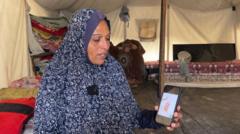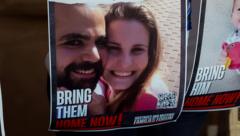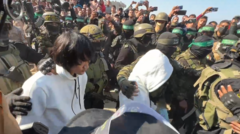In Rafah, Gaza, the search for missing persons continues under tragic conditions, with thousands still unaccounted for. Haitham al-Homs and his team tirelessly sift through rubble, where recovering human remains reveals the depth of tragedy faced by families like Lina al-Dabah, who grapples with the loss of her daughter Aya. This heart-wrenching narrative underscores the profound impact of war on the human spirit, where the search for closure intertwines with endless sorrow.
Bones of Innocence: The Tragic Search for Missing Loved Ones in Gaza

Bones of Innocence: The Tragic Search for Missing Loved Ones in Gaza
Amidst the chaos of conflict in Gaza, families confront harrowing realities as they search through rubble for missing relatives, hoping to find closure amidst overwhelming grief.
Amid the debris of war-torn Gaza, a haunting reality emerges as families mourn the loss of their loved ones, many still missing and feared dead. Lina al-Dabah, a mother whose heart shatters with every memory of her daughter Aya, recalls the innocent life cut short by conflict. Amongst the remnants of furniture and shattered glass, the multi-coloured backpack of her daughter serves as a painful reminder of the life that was. “Everything gets mixed up together," Lina laments, surrounded by remnants that bear witness to unimaginable suffering.
Haitham al-Homs, director of Emergency and Ambulance Services in Rafah, underscores the anguish felt throughout the area. Following the withdrawal of Israeli forces, approximately 150 civilians have contacted services in hopes of finding their missing relatives underneath the rubble, with the Palestinian health authorities estimating that at least 10,000 people remain unaccounted for. As search teams navigate through the wreckage, the lack of identifiable markers often necessitates reliance on the accounts of grieving families and the grim scent of decomposition that permeates the air.
In an environment where cruelty abounds, Mr al-Homs carefully compiles lists of found remains, often only recovering a mere pile of bones. The destruction wrought by high explosive bombs has rendered bodies and lives indiscriminately fragmented. Each day, those tasked with recovery encounter the painful aftermath of mass loss. “We see terror,” asserts Osama Saleh, who recently discovered a skeleton of a victim in his own home upon returning post-ceasefire.
The sorrow endured by families is palpable, as they flock to hospitals desperately seeking closure. In the courtyard of the European Hospital, fragments of bones and clothing evoke a deep sense of loss. Zaki, an uncle searching for his missing nephew Abdul Salam, faces uncertainty even when the remains match the clothing worn by the beloved teenager. An emotional reunion with family members searching for answers brings forth an outpouring of grief as they confront the stark reality of shared loss.
Aya al-Dabah was only thirteen years old when an Israeli sniper's bullet silenced her life in a school that had become a refuge. Her mother, a portrait of grief, recounts the moment she had to leave her child buried to seek safety. After learning the horrific news of her daughter's dismemberment post-conflict, the deep sorrow transforms into a feeling of helplessness. “I can't control my nerves,” Lina confesses, as she yearns for the opportunity to grant Aya the dignified burial she deserves.
As families like Lina's navigate through profound tragedy, questions abound—what should have been done differently? Amidst the rubble, the struggle for remembrance and closure persists, as the search for missing loved ones continues in the wake of insurmountable loss. The pain woven through these narratives does not fade; it lingers, echoing the heavy toll war exacts upon humanity.






















